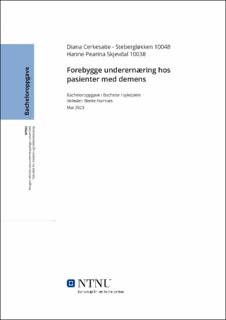| dc.contributor.advisor | Hamnes, Bente | |
| dc.contributor.author | Cerkesaite - Stebergløkken, Diana | |
| dc.contributor.author | Skjevdal, Hanne Pearina | |
| dc.date.accessioned | 2023-06-30T17:20:06Z | |
| dc.date.available | 2023-06-30T17:20:06Z | |
| dc.date.issued | 2023 | |
| dc.identifier | no.ntnu:inspera:139478172:147586077 | |
| dc.identifier.uri | https://hdl.handle.net/11250/3074846 | |
| dc.description.abstract | SAMMENDRAG
Tittel: Forebygge underernæring hos pasienter med demens Dato : 16.05.23
Forfattere: Diana Cerkesaite – Stebergløkken, Hanne Pearina Skjevdal
Veileder(e): Bente Hamnes
Stikkord/nøkkelord nursing, dementia, malnutrition, nursing homes, care
Antall sider/ord 51/10630 Antall vedlegg: 0
BAKGRUNN: Antall personer i Norge som blir eldre og får diagnosen demens er økende. I 2020 var det 101.000 pasienter med demens. Statistikk viser en antatt økning til 235 000 i år 2050. Underernæring hos denne pasientgruppen er en utfordring og å forebygge dette er et særskilt sykepleiefaglig ansvar.
HENSIKT: Hensikten med oppgaven er å belyse hvordan sykepleiere kan bidra til å forebygge underernæring hos pasienter med demens og å øke kunnskapen om sykepleiernes funksjon og ansvar i arbeidet med å identifisere og forebygge underernæring.
METODE: Litteraturstudie som metode ble benyttet. Systematiske søk i medisinske databaser for å finne forskningsartiklene ble utført. Funn fra artiklene ble drøftet opp mot andre forskningsartikler, mot annen teori og faglitteratur.
RESULTAT: Demenssykdom øker risiko for å utvikle underernæring. Tilleggsfaktorer med betydning for utvikling av underernæring er mangel på kunnskap og kompetanse hos helsepersonell, etiske dilemmaer, utilstrekkelig munnhelse og lite forståelse for betydningen av sosiale interaksjoner i måltidssituasjoner. Underbemanning medfører innleie av assistenter med lite kunnskap om ernæring og viktigjeten av dette for pasienter med demens.
KONKLUSJON: Sykepleiere er i behov for kompetanseheving på viktige felt som kunnskap og kompetanse, om betydningen av ernæring, kunnskap om munnhelse og mer rom for diskusjoner rundt etiske dilemmaer. Tettere samarbeid mellom sykepleierne og eksterne aktører som helsefaglige studieinstitusjoner kan gi nye muligheter. Ved å åpne for innovative ideer og løsninger, i en tid med rivende utvikling innen moderne teknologi kan det skapes brukervennlige løsninger. Noe som både helsepersonell og pasienter med riktig tilpasning kan profittere på. | |
| dc.description.abstract | ABSTRACT
Title: Prevent malnutrition in patients with dementia Date : 16.05.23
Authors: Diana Cerkesaite – Stebergløkken, Hanne Pearina Skjevdal
Supervisor(s) Bente Hamnes
Keywords Nursing, dementia, malnutrition, nursing homes, care
Number of pages/words: 51/10630 Number of appendix: 0
BACKGROUND: The number of elderly people in Norway keeps increasing and a consequence of this leads to increased number of patients living with dementia. In 2020 there were 101.000 patients with dementia. Nevertheless, this number will keep growing and is expected to increase to 235.000 patients in 2050, respectively. Malnutrition in this patient group is a challenge and preventing this is a particular professional nursing responsibility
OBJECTIVE: The purpose of this thesis is shedding light on how nurses may contribute to prevent malnutrition in patients with dementia, as well as increasing knowledge about nurses' role and responsibility to identify and prevent malnutrition.
METHOD: This thesis was based on literature study. Systematic searches of medical databases were performed. The different findings of the articles were compared, as well as comparing them to different theories and specialist literature.
RESULT: Dementia increases the risk of developing malnutrition. Other factors of importance in this respect, is lack of both knowledge and competence among healthcare personnel, ethical dilemmas that arise during mealtime situations, insufficient oral and little understanding of the social interaction in mealtime situations. Understaffing means hiring assistants with low competence of nutrition and how this affects patients with dementia.
CONCLUSION: Nurses require increased competence and knowledge in important fields such as the importance of nutrition, oral health and more time to discuss ethical dilemmas. Closer collaboration between nurses and external actors such as healthcare study institutions may provide new opportunities. Being more dynamic when it comes to innovative ideas and solutions, in this time of rapid development of modern technology could create more user-friendly solutions. Something that both health personnel and patients with the right adaptation can profit from. | |
| dc.language | nob | |
| dc.publisher | NTNU | |
| dc.title | Forebygge underernæring hos pasienter med demens | |
| dc.type | Bachelor thesis | |
